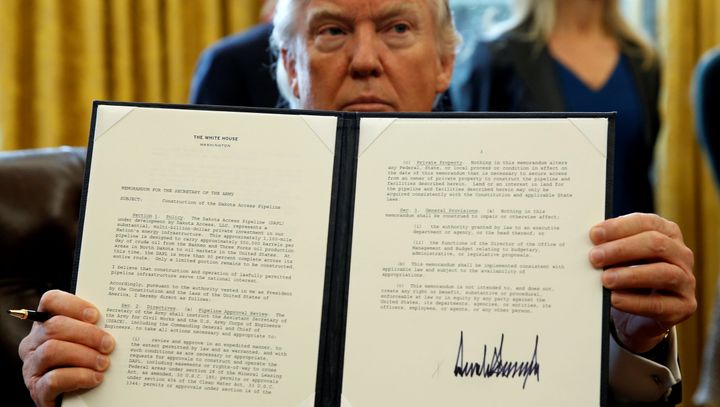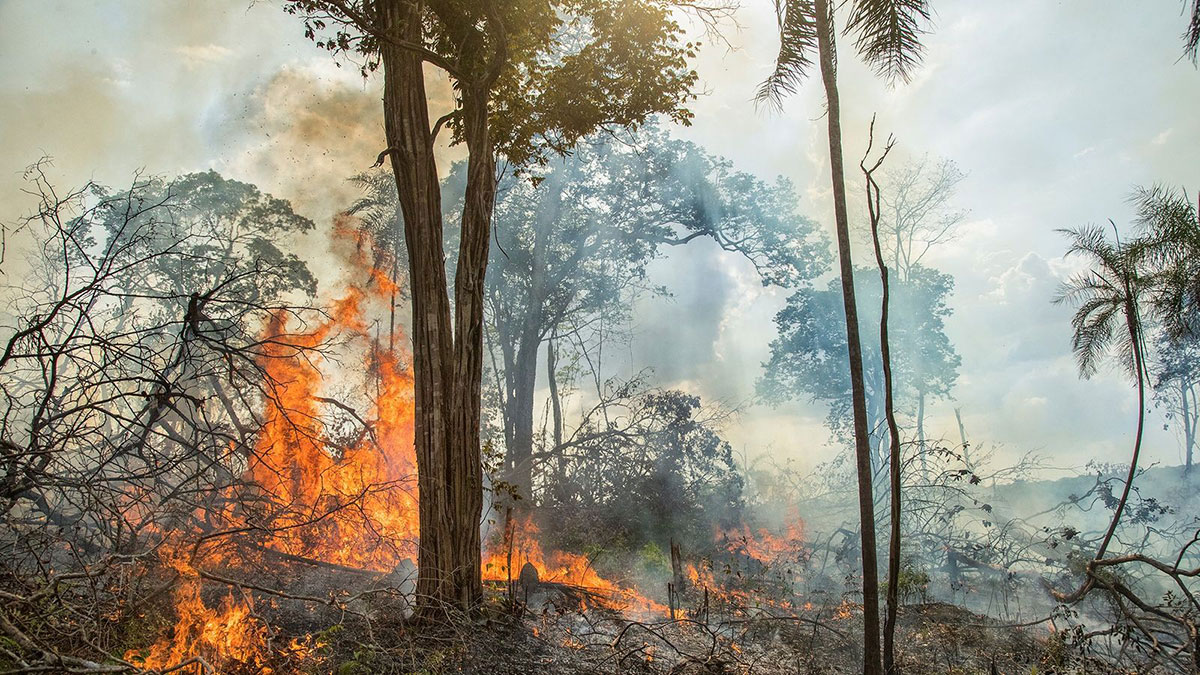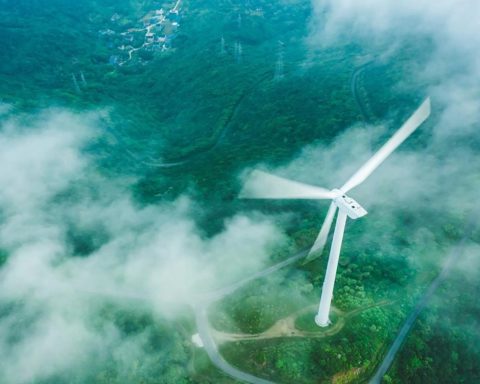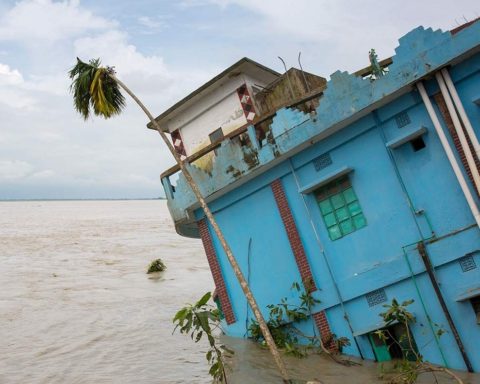Enfin de bonnes nouvelles sur le front du climat. Et de très mauvaises pour les grandes compagnies pétrolières américaines et leur supporter en chef, Donald Trump. Trois projets très controversés de construction d’oléoducs et de gazoducs viennent d’être arrêtés pour des raisons environnementales. Les écolos sont ravis, tout comme les tribus Sioux dont la terre sacrée allait être ravagée par la cupidité des hommes du fossile.
Ce weekend du 4 juillet a été un sale moment pour les compagnies pétrolières et leurs investisseurs. Et une claque pour l’hôte de la Maison Blanche. Trois projets phares pour leur business sont tombés les uns après les autres. Un château de carte qui s’effondre et c’est une nouvelle histoire du climat qui s’ouvre.
C’est comme les avions, ça vole en escadrille…
Dimanche 5 juillet, en plein weekend de fête nationale aux États-Unis, le projet de construction de l’Atlantic Coast Pipeline est annulé. Ce gazoduc, long de 500 kilomètres, était destiné à transporter du gaz de schiste fracturé de la Virginie occidentale vers la Caroline du Nord, en passant par l’État de Virginie. Quelques semaines seulement auparavant, la Cour Suprême américaine avait donné un jugement favorable à cette construction.
Le lendemain, lundi, une Cour fédérale ordonne la fermeture du pipeline Dakota Access d’ici le 5 août. Le tribunal a estimé que cet oléoduc construit en 2017 et traversant la réserve indienne de Standing Rock ne cesse d’accumuler les problèmes techniques et les déjections de pétrole dans la nature. La Cour a jugé que le projet ne répondait pas aux exigences de sécurité de la loi sur la politique environnementale. Les Sioux ont dansé à l’annonce de la décision.
Jamais deux sans trois, lundi encore, la Cour suprême a décidé que l’oléoduc Keystone XL, longtemps symbole de conflit entre les militants du climat et l’industrie des combustibles fossiles, doit également cesser sa construction en attendant une étude de son impact environnemental. Ce projet arrêté est un camouflet pour Donald Trump qui, dès sa première semaine à la Maison Blanche, avait signé en grande pompe les décrets d’autorisation.

Cette accumulation de revers en vingt-quatre heures survient à un moment où la faible demande de pétrole, le gonflement de la dette et les préoccupations croissantes concernant le changement climatique obligent les compagnies gazières à cesser leurs activités et les géants pétroliers à réduire considérablement la valeur de leurs actifs. Mais les analystes notent surtout que ces décisions indiquent que les coups de boutoirs judiciaires et la pression de plus en plus forte des organisations écologistes sont enfin efficaces pour mettre en échec les infrastructures de combustibles fossiles.
Des projets de pipelines qui semblaient autrefois inévitables, notamment avec le soutien sans équivoque de l’administration Trump, ressemblent maintenant à des paris de plus en plus risqués, alors que le président américain s’effondre dans les sondages et que les enquêtes d’opinion montrent une demande croissante pour une action fédérale agressive en matière de lutte contre le changement climatique.
L’euphorie douchée
Au cours des trois dernières années, tous les signes provenant du gouvernement fédéral ont montré que les projets d’oléoducs allaient bon train. Le président Trump a signé au cours de sa première semaine à la Maison Blanche des décrets pour accélérer la construction du Dakota Access et du Keystone XL, un oléoduc proposé depuis longtemps par le Canada. Depuis lors, l’administration Trump a assoupli les règles sur les émissions de méthane des infrastructures pétrolières et gazières, a rejeté les réglementations obligeant les agences fédérales à prendre en compte les projections de changement climatique lors de l’autorisation des projets, et a proposé de limiter fortement les examens de la NEPA, l’agence fédérale de protection de l’environnement.
Ces efforts se sont accélérés au cours des derniers mois. Les États-Unis étant devenus l’épicentre de la pandémie de coronavirus en mars, l’administration en a profité pour mettre fin à l’application des règles environnementales. En juin, l’Agence de protection de l’environnement a finalisé un changement de règle limitant le pouvoir des États de superviser les permis pour les pipelines approuvés au niveau fédéral dans le cadre du Clean Water Act. Cette nouvelle restriction fait suite à la décision de l’État de New York, à la mi-mai, de rejeter le Williams Pipeline, un projet de gazoduc qui aurait transporté du gaz fracturé de la Pennsylvanie vers des habitations situées dans certaines parties de New York et de Long Island.
La série noire de refus que vient de vivre l’industrie fossile illustre un changement de tendance en cours. Dans l’affaire du Williams Pipeline, les activistes climatiques ont tenu tête aux régulateurs de l’État, avertissant que la construction de nouvelles infrastructures gazières dépassaient les limites que les scientifiques considèrent comme sûres, ou risquaient de faire payer aux New-Yorkais des coûts énergétiques imprudents. Les régulateurs ont donc procédé à une analyse approfondie qui a permis de conclure que le gazoduc n’était pas nécessaire pour répondre à la demande régionale. Au lieu de cela, ont constaté les régulateurs, les énergies renouvelables et les travaux sur l’efficacité énergétique pourraient faire une vraie différence.
« Chaque fois que vous faites une déclaration d’impact environnemental, vous pesez l’impact négatif potentiel par rapport au bénéfice potentiel du projet, et les gens sont devenus bien meilleurs pour identifier ce que peuvent être les impacts négatifs potentiels », a déclaré Suzanne Mattei, analyste de la politique énergétique à l’Institute for Energy Economics and Financial Analysis. « La contribution du public est devenue beaucoup plus sophistiquée au cours de la dernière décennie, et le prétendu bénéfice est beaucoup plus sujet à caution maintenant ».
Le candidat démocrate à la présidence Joe Biden ne s’y est pas trompé et a juré de tuer Keystone XL. Il soutient la promotion de sources d’énergie à faible teneur en carbone, même si cela se fait au détriment des emplois dans le secteur du pétrole et du gaz.
Les temps changent
Le pipeline de Dakota Access a coûté 8 milliards de dollars ce qui n’a pas empêché des séries de problèmes techniques et de retards. On y a trouvé des graves ruptures et fuites au moins cinq fois au cours de ces six premiers mois d’exploitation seulement. Dans sa décision de lundi, le juge a estimé que le Corps des ingénieurs de l’armée n’avait pas correctement pris en compte le risque que de tels déversements représentaient pour les réservoirs d’eau potable vitaux.
Dans le cas de l’Atlantic Coast Pipeline, les compagnies Dominion Energy et Duke Energy Corporation ont déclaré que les retards et les défis anticipés du projet, qui a été proposé pour la première fois en 2014, ont bouleversé les plans de construction, même après que la Cour suprême eut décidé le mois dernier que le pipeline pourrait passer sous le Sentier des Appalaches. « Cette annonce reflète l’incertitude juridique croissante qui entoure le développement d’infrastructures énergétiques et industrielles à grande échelle aux États-Unis », ont déclaré Thomas Farrel, PDG de Dominion, et Lynn Good, PDG de Duke, dans une déclaration commune.
Le secrétaire à l’énergie du gouvernement Trump, Dan Brouillette, a accusé « le lobby environnemental obstructionniste et bien financé » d’avoir tué le projet. Mais David Livingston, analyste principal de l’énergie au sein du groupe Eurasia, a déclaré au Huff Post que le besoin urgent de réduire les émissions de gaz à effet de serre a uni des groupes autrefois disparates en opposition à des projets qui vont à l’encontre des appels des scientifiques à commencer à réduire considérablement le recours aux combustibles fossiles. « Le fait que le changement climatique n’est pas seulement un phénomène de 2020, et qu’il va être un facteur persistant et concret pour les entreprises énergétiques, change leurs calculs lorsqu’ils regardent et pèsent les risques [et] les avantages de ce genre de projet », affirme-t-il.
Malgré leurs succès, les défenseurs de l’environnement ne doivent pas pour autant baisser la garde. En effet, ces décisions ne ralentiront peut-être pas tous les projets de pipeline. Le Mountain Valley Pipeline, un gazoduc proposé pour transporter le gaz des champs de fracturation de Virginie occidentale aux compagnies de gaz en Virginie, est en grande partie achevé et devrait avancer, malgré les retards et les défis des environnementalistes.
Le consortium d’entreprises à l’origine du PennEast Pipeline, un projet proposé pour pomper du gaz de la Pennsylvanie vers le New Jersey, a proposé des itinéraires alternatifs en janvier pour commencer la construction malgré le refus de l’État de délivrer des permis. Au Texas, pendant ce temps, les équipes de construction avancent sur le Permian Highway Pipeline, malgré la crise du COVID-19 qui a complètement désorganisé l’État. Toutefois, même dans cet État longtemps considéré comme un havre de paix pour l’industrie du pétrole et du gaz, les batailles juridiques s’accumulent. En juin, des propriétaires terriens et des groupes de protection de la nature locaux ont poursuivi la société à l’origine du gazoduc, pour avoir déversé du fluide de forage qui aurait contaminé les eaux souterraines.
Décidément, il va être de plus en plus difficile de construire de nouvelles infrastructures pour les combustibles fossiles. C’est un vrai coup dur pour l’industrie pétrolière et gazière américaine. En effet, ces géants de l’énergie fossile ont besoin d’un réseau de pipelines suffisamment gargantuesque qui s’étende sur des millions de kilomètres. La capacité du pays à développer cette infrastructure est mise à l’épreuve comme jamais auparavant. « Je m’attends à ce que ce soit un tournant pour les nouveaux investissements », a déclaré à Bloomberg Katie Bays, co-fondatrice du cabinet de conseil Sandhill Strategy. « Il y a une réelle lassitude des investisseurs autour de cette parade de vents contraires légaux et réglementaires aux projets énergétiques. ». Les pétroliers seraient-ils devenus des pestiférés aux yeux des investisseurs ?
- LIRE DANS UP’ : Les pestiférés
Les producteurs de pétrole qui ont des intérêts importants dans le champ de schiste du Dakota, ont vu leurs actions chuter lundi matin à la suite de l’ordre de fermeture de Dakota Access. Et le manque de nouveaux pipelines dans le Nord-Est des États-Unis pourrait entraver les producteurs des Appalaches et accélérer le rythme de la transition vers les énergies renouvelables.
 Lundi, la réserve de la tribu des indiens de Standing Rock était en fête. Grâce à des années de résistance, les terres de leurs ancêtres ne seront pas traversées par les installations pétrolières. « Vous avez déjà eu un rêve, un rêve qui se réalise ? C’est ce que nous vivons !« , a exulté LaDonna Brave Bull, une indienne Sioux de la tribu, fondatrice du Camp des pierres sacrées, où la résistance en 2016 a amené des dizaines de milliers de personnes à s’opposer à la construction du pipeline sur des terres sacrées.
Lundi, la réserve de la tribu des indiens de Standing Rock était en fête. Grâce à des années de résistance, les terres de leurs ancêtres ne seront pas traversées par les installations pétrolières. « Vous avez déjà eu un rêve, un rêve qui se réalise ? C’est ce que nous vivons !« , a exulté LaDonna Brave Bull, une indienne Sioux de la tribu, fondatrice du Camp des pierres sacrées, où la résistance en 2016 a amené des dizaines de milliers de personnes à s’opposer à la construction du pipeline sur des terres sacrées.
Sources : Huffington Post, Bloomberg
Image d’en-tête : Scott Olson/Getty Images












